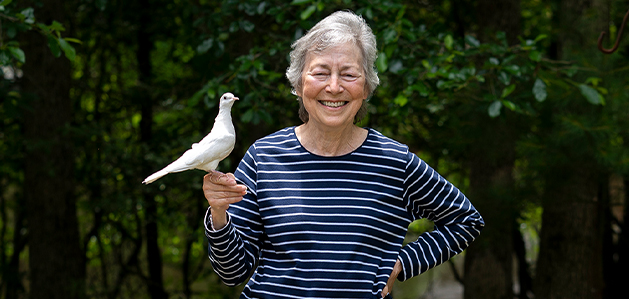4 Essential Cancer Screenings
How do you know what cancer screenings to have and when? This guide outlines the appropriate times for four types of routine screenings to reduce your risk.
By Jackie Miller, MSN, RN, OCN, Program Manager, NJCEED Cancer Screening Program
Cancer was not even remotely on her radar when Robin M. was diagnosed with stage III breast cancer at age 21. After finding a growing, painful lump in her breast, she knew it wasn’t normal.
“Unfortunately, breast cancer can happen to anyone at any age,” says Robin, who had no family history of the disease and tested negative for the breast cancer gene. “Women should know the normal characteristics of their breasts so they know immediately when there are changes.”
Thanks to advanced screenings, we can detect many cancers earlier and more reliably than ever. Breast cancer, for example, can be found after symptoms appear, but many women with breast cancer have no symptoms. Tests such as yearly mammograms can detect breast cancer early, when it’s most treatable. Likewise, a colonoscopy can lead to the removal of a precancerous polyp before it has the chance to develop into colon cancer.Recently the link between the human papillomavirus (HPV) and cervical cancer has pushed the topic to the forefront of discussions on cancer prevention.
Cervical cancer is highly preventable with vaccination and screening tests, which can find problems with the cervix soon after they start. With early detection, cervical cancer is treatable, with long survival and good quality of life.
How do you know when to be checked and for what? Here is a quick guide to help you plan for these essential cancer screenings.
Breast Cancer
All women should know the normal characteristics of their breasts, and report changes to their health care provider. The American Cancer Society recommendations for women at average risk are:
- Women between 40 and 44 have the option to start screening with a mammogram every year.
- Women 45 to 54 should get mammograms every year.
- Women 55 and older can switch to a mammogram every other year, or they can choose to continue yearly mammograms. Screening should continue as long as a woman is in good health and is expected to live at least 10 more years.
Cervical Cancer
- All women should begin cervical cancer screening at age 21.
- Women aged 21 to 29 should have an annual GYN exam and a Pap test every three years as long as the test results are normal.
- Beginning at age 30, women should have an annual GYN exam and be screened with a Pap test combined with a HPV test every five years as long as the test results are normal. This is called co-testing and should continue until age 65.
The U.S. Centers for Disease Control and Prevention recommends vaccination against HPV at age 11 or 12. Anyone who did not receive a vaccine at 11 or 12 can receive a “catch-up” vaccination through age 26.
Skin Cancer
Know your moles, and make sure your annual health check-ups include a skin check. If you’ve spent a lot of time in the sun or notice a change in the size or shape of a mole, see a dermatologist.
Colon Cancer
Do you have a family history of the disease, changes in your bowel habits, blood in your stool, unintended weight loss or abdominal pain? If so, talk to your doctor about colon cancer screening regardless of your age. All men and women age 45 and older should have a colonoscopy every 10 years or a sigmoidoscopy every five years. If you have a family history of colon cancer, your doctor may recommend a colon cancer screening prior to age 45.
Because more people are getting screened for colon cancer, we’re detecting the disease earlier and more often. Routine colonoscopies can find colon cancer in its early stages. This screening procedure allows your doctor to examine your colon for signs of polyps (abnormal growths on the inside surface of the colon) and remove them before cancer develops.
While routine cancer screenings are important to your health, a healthy lifestyle remains a vital part of disease prevention. Remember to eat a diet rich in fruits and vegetables, avoid tobacco, maintain a healthy weight, exercise regularly and protect yourself from sun exposure.
Virtua Health offers comprehensive cancer care, close to home in South Jersey
Need help scheduling your screenings? Call 888-847-8823 to speak with a Virtua Health navigator.
Don't forget to sign up for our Good Vibes newsletter for the latest health news, classes and support group offerings.
There's So Much More to Explore
Discover expert insights, inspiring stories, health tips, and more by exploring the content below!

10 Reasons To Schedule Your Colonoscopy Today
Is an At-Home Colon Cancer Test a Good Alternative to a Colonoscopy?

The HPV Vaccine: A Powerful Shield Against Cervical Cancer

How Does Breast Density Affect Your Mammogram?

Breast Cancer Diagnosis Inspires Catherine to Help Others

Put Your Mammogram Appointment on the Top of Your To-Do List
Firefighter's Successful Lung Cancer Care at Virtua

A Breast Self-Exam Saved Kristen's Life

Protect Your Child From HPV and Related Cancers

What to Know About Cervical Cancer Screenings
6 Tips for an Easier Colonoscopy Prep

Rectal Cancer Surgery Gets Eileen Back to her Magical Life | Virtua Health
Robotic Surgery Helps Shelly Haney Return to Her Happy Place

